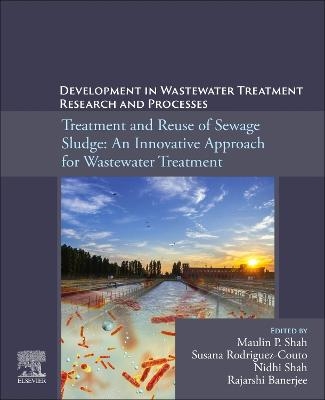
Development in Waste Water Treatment Research and Processes
Elsevier - Health Sciences Division (Verlag)
978-0-323-85584-6 (ISBN)
In addition, the book includes numerous current and advanced sewage sludge treatment and reuse technologies and associated microbes to effectively treat and manage hazardous industrial wastes/or wastewater pollutants for environmental safety, sustainability and public health protection. The book is a reference for all researchers working in the field of environmental engineering, bioengineering, waste management, and related fields.
Dr. Maulin P. Shah is an active researcher and scientific writer in his field for over 20 years. He received a B.Sc. degree (1999) in Microbiology from Gujarat University, Godhra (Gujarat), India. He also earned his Ph.D. degree (2005) in Environmental Microbiology from Sardar Patel University, Vallabh Vidyanagar (Gujarat) India. His research interests include Biological Wastewater Treatment, Environmental Microbiology, Biodegradation, Bioremediation, & Phytoremediation of Environmental Pollutants from Industrial Wastewaters. He has published more than 250 research papers in national and international journals of repute on various aspects of microbial biodegradation and bioremediation of environmental pollutants. He is the editor of 200 books of international repute (Elsevier, RSC, Nova Sciences, De Gruyter, Springer, Wiley, IOP and CRC Press). Susana Rodríguez-Couto (female) got her B.Sc. and M.Sc. in Chemistry (Industrial Chemistry) from the University of Santiago de Compostela in 1992 and her Ph.D. in Chemistry in 1999 from the University of Vigo, obtaining the maximal grade (magna cum laude) and, in addition, she was awarded with the Extraordinary Prize for Doctoral Thesis in Chemistry. She worked as an Associate Professor and an Isidro Parga Pondal Senior Researcher at the University of Vigo (2000-2004), as a Ramón y Cajal Senior Researcher at Rovira i Virgili University (2004-2008) and as an Ikerbasque Research Professor (2009-2019). She has also worked as an Invited Researcher at the Institute from Environmental Biotechnology, Graz University of Technology (Austria) and at the Department of Biological Engineering, University of Minho (Portugal). In 2008, she received the I3 Professor from the Spanish Ministry of Science and Education to the recognition of an outstanding research activity. In March 2021 she is joining LUT School of Engineering Science at Mikkeli, Finland, as a Full Professor in biological water treatment. She has published more than 140 articles in highly reputed international journals (h index 42). She is editor of several journals (3Biotech, Frontiers) and 14 Elsevier books. Dr Nidhi Shah, visiting assistant professor in analytical chemistry at Indiana university southeast, US. Her research interests are in synthesis of metal nanoparticles and electrochemistry. She did her masters in organic chemistry from India and PhD from University of Louisville, US. Her article on electrochemical synthesis of silver nanorods on to interdigitated gold electrodes got accepted in a high impact factor journal ACS Nano. This research article showed potential application in resistive switches. Her current research interest is electrochemical synthesis of silver nanorods on electrode surfaces. She teaches analytical chemistry courses to undergraduates at Indiana University. Dr. Rajarshi is a trained microbiologist with a professional experience of more than 1.5 decades encompassing academics, research and advocacy in the field of biotechnology. With an MBA (HR) to his credit, he has been associated with undergraduate and post graduate teaching and guiding doctoral theses. An ardent research planner, implementer and achiever with multicultural experience of spearheading in establishment, training and development of laboratory operations. As an AVP (R&D) he has kept himself rooted to planning, designing, establishing, standardizing laboratories to the scale of recognition and certification. Specialized in Fecal Seprage Management wastewater treatment, recycling and reuse as well as resource recovery/ reuse of solid waste; Rajarshi has put himself online with the present breed of Septage Management researchers globally. His work in antibiotic resistance spread in environment and sale of genetically modified foods has led the government (ICMR& FSSAI) to come up with policies and NAPs. With numerous publications to his credit and with a knack of human resource development has been instrumental in setting up and advocating on Septage Management and Wastewater treatment, and bio solid waste reuse/recycling.
1. Sewage Sludge: What it is?
2. Sewage Sludge: Chemical Composition of Raw Sludge and its Significance
3. Sewage Sludge: Treatment and Disposal Norms and Legislations (Global)
4. Sewage Sludge: Treatment (Electro-Mechanical) Practices
5. Sewage Sludge: Treatment (Gasification) Practices
6. Sewage Sludge: Treatment (Physico-Chemical) Practices
7. Sewage Sludge: Treatment (Bio-Chemical) Practices
8. Sewage Sludge Recovery: Composition, Reuse Potentials
9. Sewage Sludge: Reuse (Composting and Manure)
10. Sewage Sludge: Reuse (Waste to Energy Potential Practices)
11. Sewage Sludge: Digging the Gold: Future Potentials & Practices
12. Sewage Sludge: Contribution to Sustainable Circular Economy with Case Studies
| Erscheinungsdatum | 03.10.2022 |
|---|---|
| Verlagsort | Philadelphia |
| Sprache | englisch |
| Maße | 191 x 235 mm |
| Gewicht | 450 g |
| Themenwelt | Naturwissenschaften ► Biologie ► Mikrobiologie / Immunologie |
| Technik ► Umwelttechnik / Biotechnologie | |
| ISBN-10 | 0-323-85584-9 / 0323855849 |
| ISBN-13 | 978-0-323-85584-6 / 9780323855846 |
| Zustand | Neuware |
| Haben Sie eine Frage zum Produkt? |
aus dem Bereich


